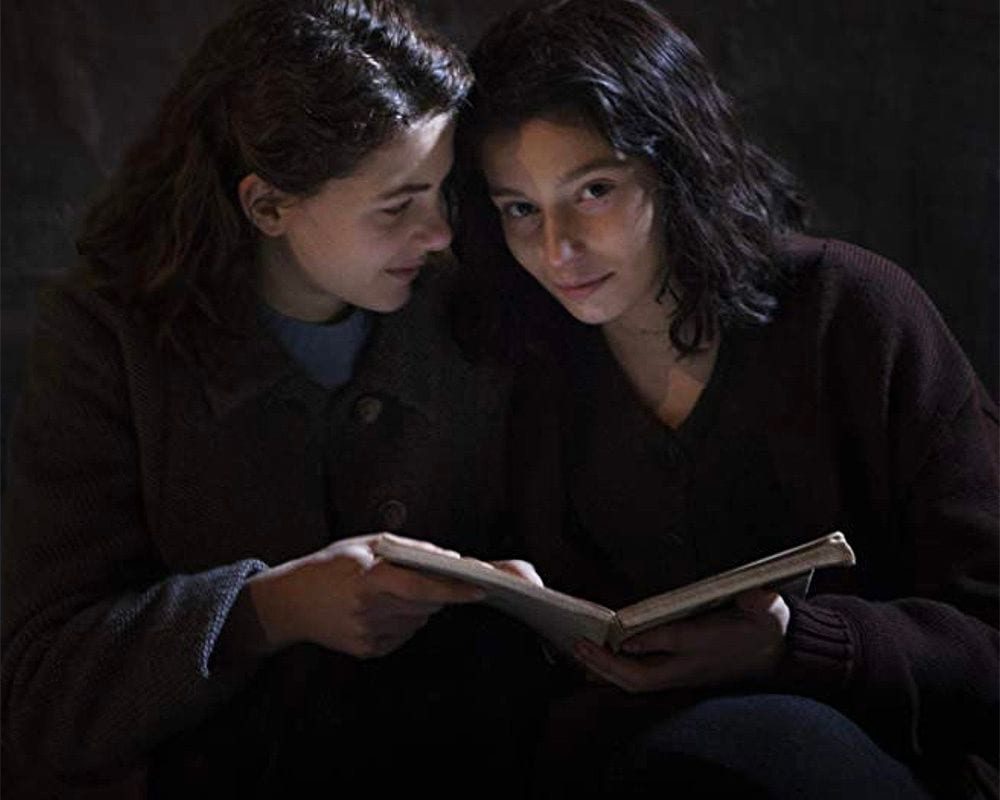TV by AlexAntropov86 (Pixabay License / Pixabay)
Amid the numerous new dramas that television had to offer in 2018 – from HBO’s Sharp Objects to Netflix’s Maniac to Amazon’s Homecoming – My Brilliant Friend (L’amica geniale) premiered in November on HBO without much fanfare. A slow-paced and cinematic series featuring Italian dialogue and English subtitles, My Brilliant Friend is the television adaptation of the eponymous best-selling novel by the pseudonymous author Elena Ferrante – the first in her four-part anthology that covers over 60 years in the lives of Elena Greco and Lila Cerullo.
Set in a dire working-class neighborhood outside Naples in the 1950s,
My Brilliant Friend feels almost radical for its raw and un-romanticized depiction of female friendship in all its emotional complexities. Director Saverio Costanzo’s cinematography features a muted color palette, highlighting dilapidated buildings, dusty roads and children covered in dirt, and thus contributes to the raw feel of the series.
In the span of eight episodes, we see that the relationship between Elena and Lila, which begins to take shape in elementary school, is as loving and supportive as it is fraught with petty jealousies, rivalry, and downright nastiness at times. The girls compete over who gets better grades, who reads more books, and who can learn Latin and Greek first. Much to Elena’s frustration, she observes in voiceover narration that Lila “always did the things I was supposed to do before me and better than me.”
So that she doesn’t fall behind Lila in
every department, Elena accepts a date with one of her classmates, not because she likes him but simply because she “wanted a boyfriend before Lila.” While they are constantly competing with each other, the girls also share many tender moments of genuine affection for one another: Lila helps Elena understand and read Latin; Lila redacts Elena’s first newspaper article; Lila and Elena read Little Women together and plan to write a book of their own with hopes it will lead to their escape from poverty.
(©Eduardo Castaldo/HBO / IMDB)
My Brilliant Friend offers a multifaceted portrait of the lives of two young women struggling to find their voice and place in a deeply sexist and violent environment, where men beat their spouses, parents beat their children, and children beat each other. The evolution of Lila, from a precocious child (played by Ludovica Nasti) to a fierce young adult (in an impressive performance by Gaia Girace), is especially thrilling to watch. Her character embodies the figure of the willful child. Feminist scholar Sara Ahmed notes in 2014’s Willful Subjects (Duke University Press) that “the willful child is the one who is disobedient, who will not do as her mother wishes. Willfulness is a diagnosis of the failure to comply with those whose authority is given” (1). In other words, the willful child is recognized as a troublemaker, a problem that needs to be corrected in order to preserve “the familial as well as social order” (ibid: 63).
On the second episode, for example, Lila announces to her parents that she will take the admissions test to go on to middle school with or without their permission – at a time when children were expected to start working soon after completing their elementary education. “I’m going to school. I don’t give a damn,” says Lila. This act of defiance sends her dad, Don Fernando, into a fit of rage, who proceeds to beat her and to throw her out the window. With a broken arm, Lila insists, “I’m not hurt,” while Fernando continues to shout: “Look what you made me do, you little bitch!” “You were born to spite me!” Violence is thus “rationalized”. Don Fernando seeks to beat the will out of Lila in order to shape her into an obedient daughter who will work, get married, and start a family.
Ahmed further explains that to be willful is to be persistent: “Willfulness involves persistence in the face of having been brought down, where simply to ‘keep going’ or to ‘keep coming up’ is to be stubborn and obstinate. Mere persistence can be an act of disobedience” (ibid: 2). Lila’s willfulness is evident throughout the series as she persists in getting an education. She secretly studies Latin and Greek and spends her days at the local library reading literature. When her will falters, Elena (played with quiet force by Margherita Mazzucco) is there for her to encourage her to keep going and to keep fighting.
Paradoxically, Elena is also a painful reminder of what Lila will never be able to accomplish. Unlike Lila’s parents, Elena’s father grants her the opportunity to attend middle school and high school. Lila’s pain is palpable in one heartbreaking scene on the final episode, when Lila is planning her wedding and Elena asks her to revise her first article for her school’s paper. After redacting it, Lila turns to Elena and says: “You really are good. But I don’t want to read anything more of what you write.” With a puzzled look, Elena asks why. Lila softly responds: “Because it hurts me.” The hurt is due to her lack of choices, her lack of opportunities to become something more than just a housewife.
While Lila accepts the fact that she has to get married to please her parents, she does not lose her willful spirit. For example, Don Fernando wants Lila to marry Marcello Solara (Elvis Esposito) – one of the wealthiest families in the neighborhood – but Lila repeatedly rejects his advances. In one scene on the fifth episode, Don Fernando tells Lila: “I advise you to say yes. Not just for you, but for the whole family.” Nunzia, his wife, agrees: “You need to think about your life, but about us, too.” Lila responds that she’ll rather die than to marry Marcello. Visibly irritated, Don Fernando tells her: “You’ll do as I say,” and slaps her. Lila stands her ground and shouts: “No! Not even if you kill me.”
An aspect to note here is that shouting, as Ahmed points out, can be a form of “rebellious noise” (ibid: 156). Women may find themselves shouting “in frustration at the difficulty of getting through” (ibid), of being heard. Every time Lila says no – to her father, to Marcello – she insists on exerting her will and getting what she wants.
Ahmed further notes that the willful child is the one who refuses to reproduce the family: “The child must not only become part of the family, a willing member… but as part must become a point, willing to extend the family line, to assemble a new body” (ibid: 113). She continues, “To be willful is thus to refuse what we might call ‘the reproductive duty,’ as the duty of a part to reproduce the whole or at least to be willing to participate in reproduction” (ibid: 114). In other words, children are expected to reproduce in order to keep the family together, and by extension the nation.
Lila’s parents and brother describe her on numerous occasions as “rude”, “difficult”, a “bitch”, and as “always making trouble”, because she is perceived to be unwilling to go along with her family’s wishes. She is perceived to be getting in the way of the family’s opportunity to climb the social ladder and attain happiness. Lila ultimately does get married, but to a man that she chooses and genuinely loves – a small victory for her, considering her limited circumstances.
HBO and the Italian broadcaster RAI announced in December that My Brilliant Friend would be renewed for a second season and would be based on Ferrante’s second installment of her Neapolitan anthology, The Story of a New Name. The story of the complicated lives and friendship of Elena and Lila soldiers on, like the brave protagonists, and should not be missed.



